本文介紹了 TMS320C5515主要特性,方框圖以及醫(yī)療開發(fā)套件(MDK)硬件方框圖,ECG 前端方框圖,前端板電路圖詳細電路圖和所用材料清單(BOM)。
TMS320C5515 DSP是TI 公司的醫(yī)療開發(fā)套件(Rev. B)支持完整的醫(yī)療應(yīng)用開發(fā)如心電圖(ECG),數(shù)字聽診器和脈沖血氧計等。典型應(yīng)用包括模擬前端(AFE),信號處理算法以及用戶控制與交互。TMS320C5515是低功耗定點數(shù)字信號處理器(DSP),采用TMS320C55x? DSP處理器核,內(nèi)核工作電壓1.05V/1.3V,I/O電壓為1.8/2.5/2.75/3.3V。
16.67/13.33/10/8.33-ns 指令周期,時鐘速率60-,75-,100-,120-MHz,具有320KB 片內(nèi)RAM。
TMS320C5515主要特性:
HIGHLIGHTS:
High-Perf/Low-Power, C55x? Fixed-Point DSP
16.67/13.33/10/8.33-ns Instruction Cycle Time
60-, 75-, 100-, 120-MHz Clock Rate
320K Bytes On-Chip RAM
16-/8-Bit External Memory Interface (EMIF)
Two MultiMedia Card/Secure Digital I/Fs
Serial-Port I/F (SPI) With Four Chip-Selects
Four Inter-IC Sound (I2S Bus?)
USB 2.0 Full- and High-Speed Device
LCD Bridge With Asynchronous Interface
Tightly-Coupled FFT Hardware Accelerator
10-Bit 4-Input SAR ADC
Real-Time Clock (RTC) With Crystal Input
Four Core Isolated Power Supply Domains
Four I/O Isolated Power Supply Domains
Three integrated LDOs
Industrial Temperature Devices Available
1.05-V Core, 1.8/2.5/2.75/3.3-V I/Os
1.3-V Core, 1.8/2.5/2.75/3.3-V I/Os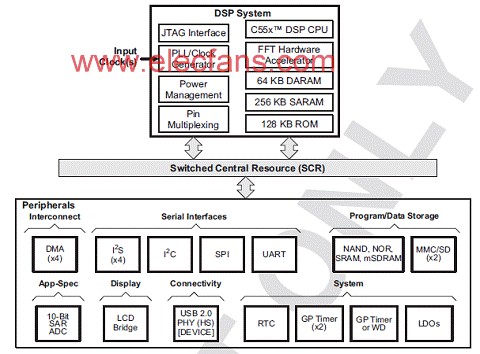
圖1。TMS320C5515方框圖
醫(yī)療開發(fā)套件(MDK)
A number of emerging medical applications such as electrocardiography (ECG), digital stethoscope, and pulse oximeters require DSP processing performance at very low power. The TMS320C5515 digital signal processor (DSP) is ideally suited for such applications. The C5515 is a member of TI’s C5000? fixed-point DSP platform. To enable the development of a broad range of medical applications on the C5515, Texas Instruments has developed an MDK based on the C5515 DSP. A typical medical application includes:
? An analog front end, including sensors to pick up signals of interest from the body
? Signal processing algorithms for signal conditioning, performing measurements and running analytics on measurements to determine the health condition
? User control and interaction, including graphical display of the signal processing results and connectivity to enable remote patient monitoring
The MDK is designed to support complete medical applications development. It includes the following elements:
? Analog front-end boards (FE boards) specific to the key target medical applications of the C5515 (ECG, digital stethoscope, pulse oximeter), highlighting the use of the TI analog components for medical applications
? C5515 DSP evaluation module (EVM) main board
? Medical applications software including example demonstrations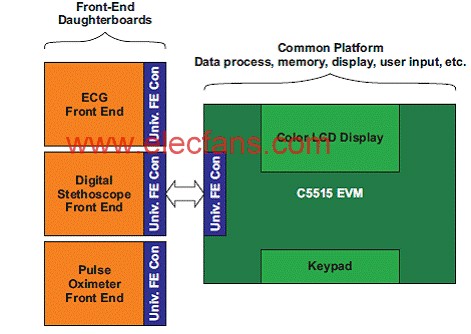
圖2。醫(yī)療開發(fā)套件(MDK)硬件方框圖
MDK Hardware Overview
An electrocardiogram (ECG/EKG) is the recording of the electrical activities of the heart and is used in the investigation of heart disease. The electrical waves can be measured by selectively placed electrodes (electrical contacts) on the skin.
醫(yī)療開發(fā)套件(MDK)ECG主要特性:
The key features of the MDK ECG system are:
? 12 lead ECG output using 10 electrode input
? Defibrillator protection circuitry
? Diagnostic quality ECG with bandwidth of 0.05 Hz to 150 Hz
? Heartbeat rate display
? Leads off detection
? Real-time 12 lead ECG waveform display on EVM LCD screen, one lead selectable at a time
? Zoom option for the Y-axis (amplitude) on EVM LCD screen
? Real-time 12 lead ECG waveform display on PC, three leads at a time
? Zoom function on X-axis (time) and Y-axis (amplitude) on PC application
? Freeze screen option on PC Application
? Recording of ECG data and offline view option of recorded ECG data on PC application Several elements of the MDK ECG system are:
? C5515 EVM
? ECG front-end board
? ECG cable
1)C5515 EVM
The EVM comes with a full compliment of on-board devices that suit a wide variety of application environments.
For further details on the C5515 EVM, see the Medical Devlopment Kit provided with your EVM.
Key components and interfaces of the C5515 EVM used in the MDK ECG system include:
? Texas Instrument’s TMS320C5515 operating at 100 MHz
? User universal serial bus (USB) port via the C5515
? Inter-integrated circuit (I2C) /serial peripheral interface (SPI) electrically erasable programmable read-only memory (EEPROM)
? External memory interface (EMIF), I2C, universal asynchronous receiver/transmitter (UART), SPI interfaces
? SAR
? External IEEE Standard 1149.1-1990, IEEE Standard Test Access Port and Boundary-Scan Architecture (JTAG) emulation interface
? Embedded JTAG controller
? Color LCD display
? Keys (user switches)
The EVM operates from a + 5 V external power supply or battery and is designed to work with TI’s Code Composer Studio? integrated development environment (IDE). Code Composer Studio communicates with the EVM board through the external emulator, or on-board emulator.
2)ECG Front-End Board
Figure 3 shows the ECG front-end board. The potentials captured by the electrodes are passed through
the defibrillator protection (DP) circuit in the ECG front-end board. Then, the front end board derives 8 out
of 12 ECG leads and provides the digital input to the DSP subsystem. The front-end board can be
interfaced with the EVM board through a universal front-end connector. The front-end board is interfaced
with and powered by the C5515 EVM board through the universal front-end connector by using I2C and
I2S interfaces.
The 16 channel analog-to-digital converter (ADC) (ADS1258) on the front-end board is configured for 500
Hz sampling with 24-bit data resolution. ADC is interfaced with the C5515 using the SPI bus.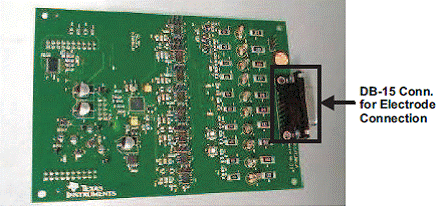
圖3。ECG板外形圖
3)ECG Cable
The ECG cable consists of four limb and six chest electrodes. This cable is connected to the front-end board through the DB15 connector. The ECG electrodes pick up ECG signals from the ECG simulator/patient and send them to the ECG front-end board; an off-the-shelf ECG cable is used. For more details regarding ECG cable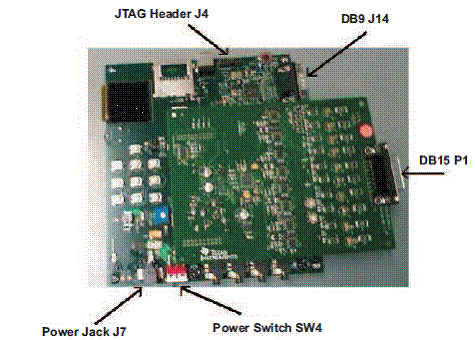
圖4。安裝在C5515 EVM的ECG前端外形圖
圖5。ECG 前端方框圖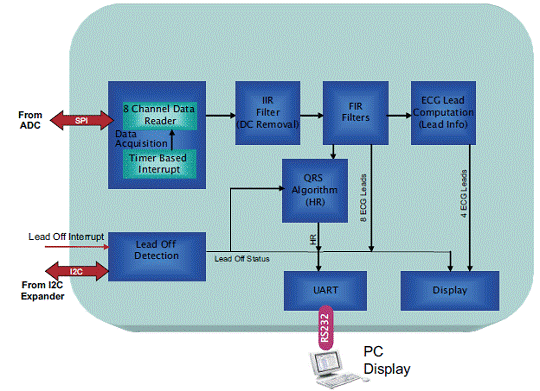
圖6。DSP軟件架構(gòu)圖
前端板電路圖
圖7。前端板電路圖:ECG_I_II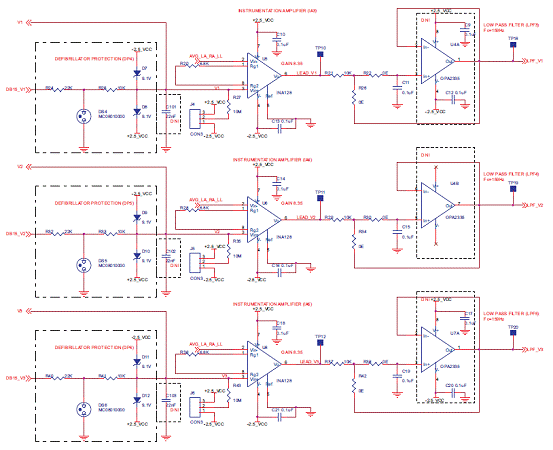
圖8。前端板電路圖:ECG_LEAD_V1_V2_V3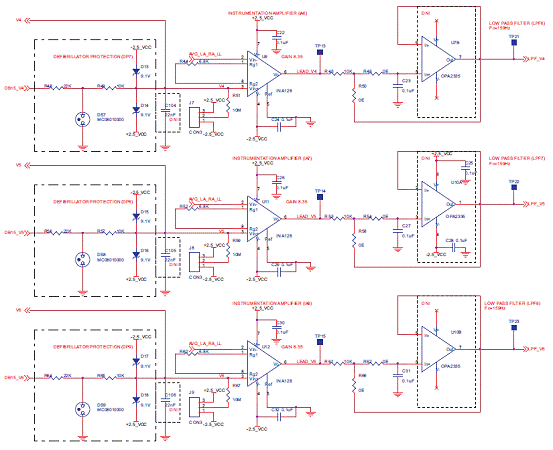
圖9。前端板電路圖:CG_LEAD_V4_V5_V6
圖10。前端板電路圖:ECG_ADC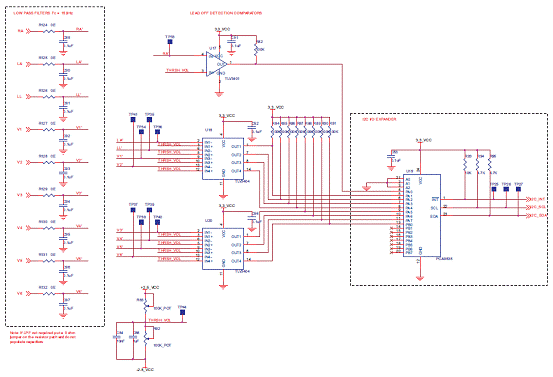
圖11。前端板電路圖:ECG_LEAD_OFF_DET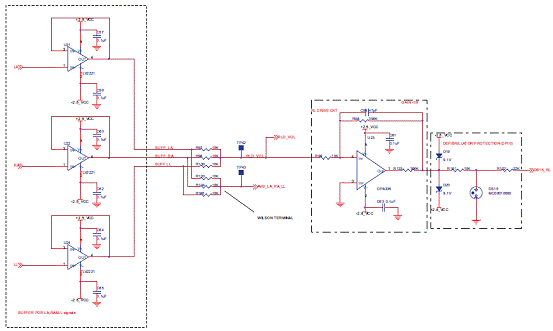
圖12。前端板電路圖:右腿驅(qū)動電路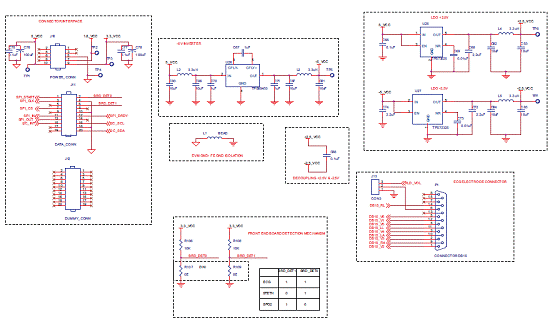
圖13。前端板電路圖:PWR_CONN_INTRFCE
前端板材料清單(BOM):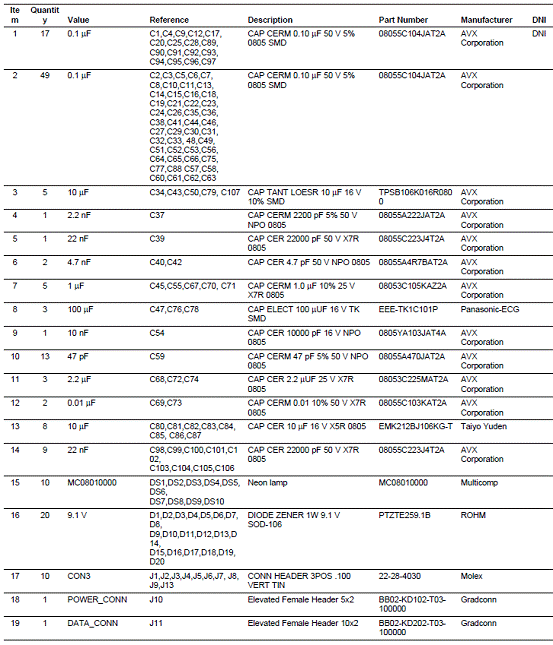
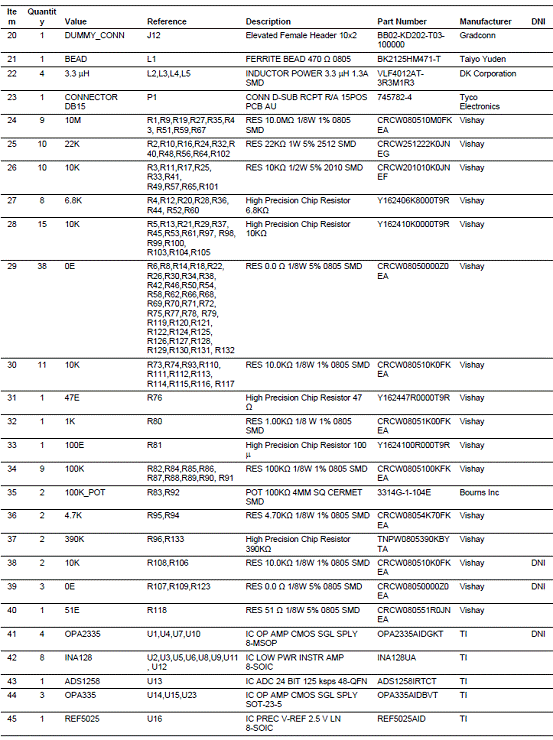
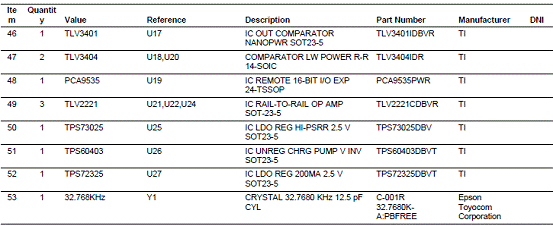
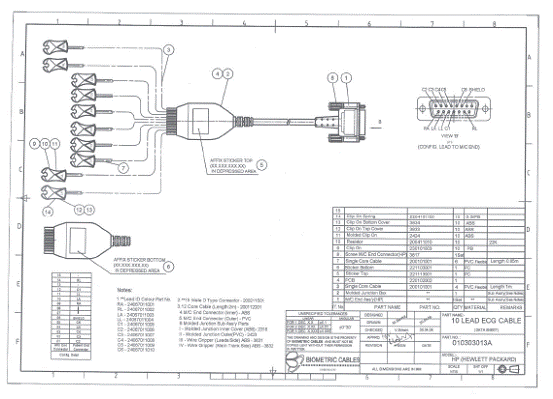
圖14。ECG 電纜詳圖
 電子發(fā)燒友App
電子發(fā)燒友App









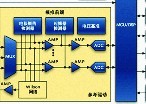
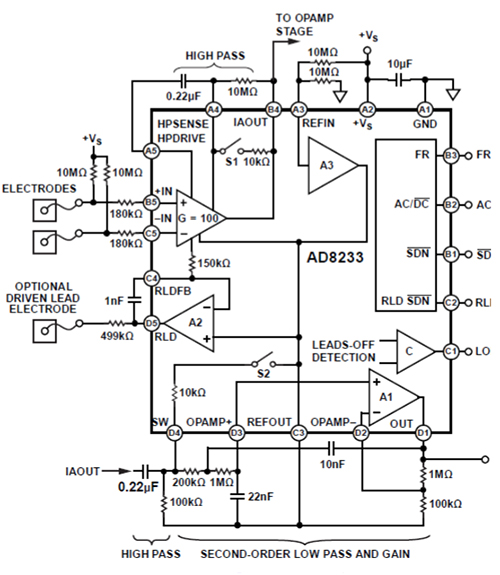

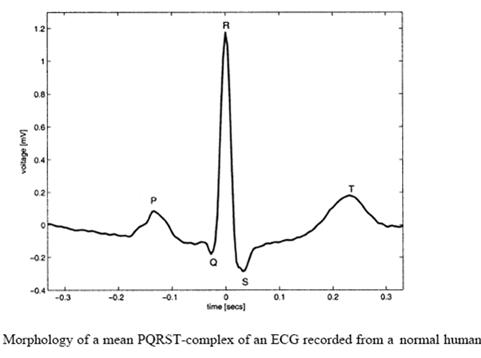
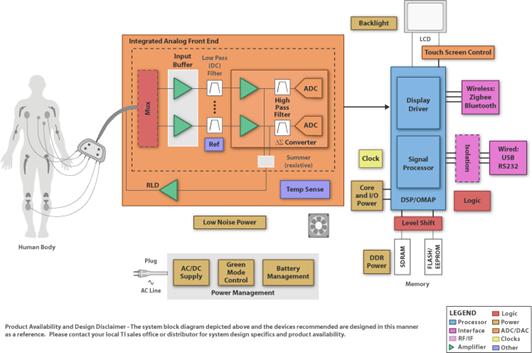


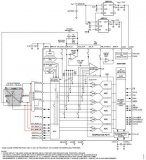
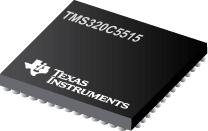
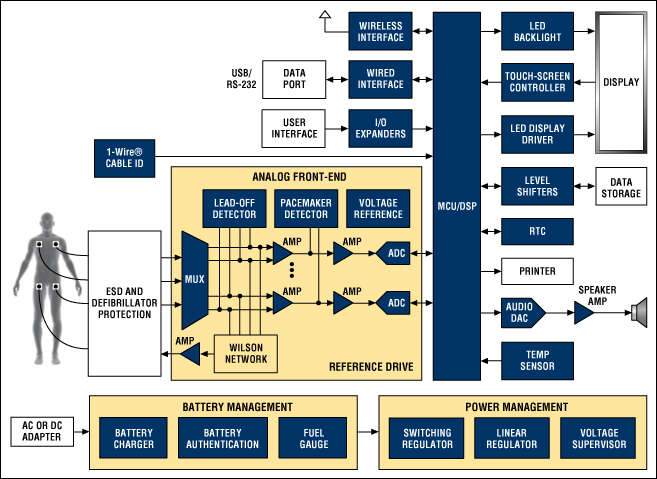










評論